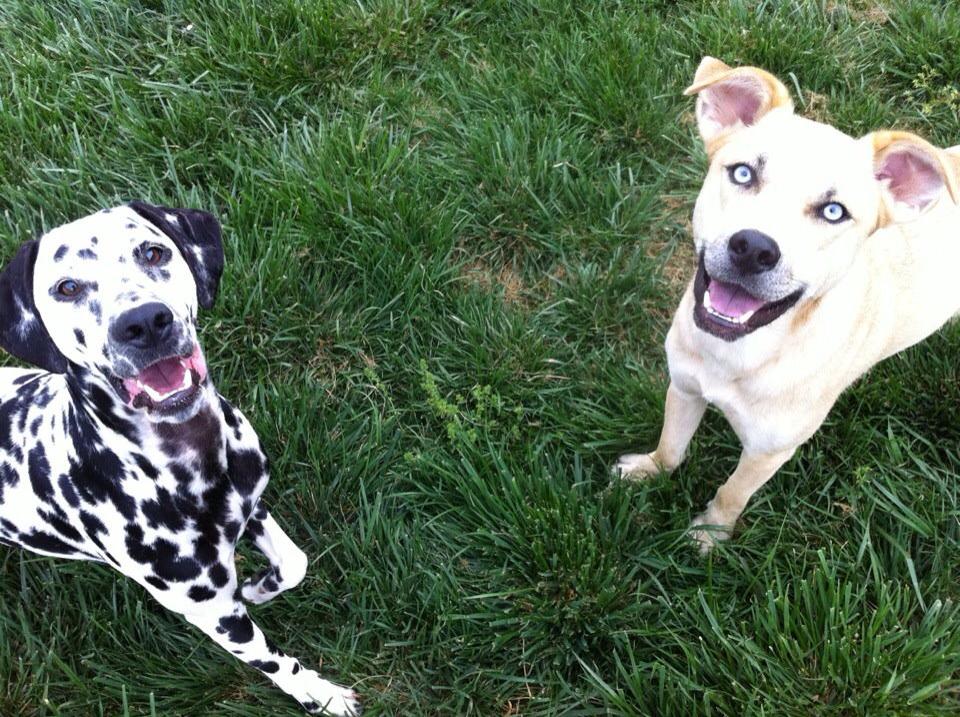Dr. Primm's Warm and Fuzzies
GUILTY until proven innocent
by Kathryn Primm DVM on 06/14/12
Have you ever come in the door to a poop pile and your dog sees you notice it and gets the guiltiest look on his face? Clients tell me almost every day that their dog "knew he did wrong". I know (trust me, I completely KNOW) how easy it is to humanize your pets' expressions and emotions. But is it fair to the pet to do so?
GUILT is a human emotion that requires a complex understanding of actions and consequences. Human children cannot even grasp these concepts in many cases. However, animals are completely dependent on their ability to be tuned in to cues from their environment. Being alert to subtle details can be a life or death skill for an animal and you are the pack leader. So when you come in the door and your dog sees you tense as you notice his accident, he is immediately on alert. He can't connect the poop accident (which may have occurred hours ago) with his actions or your reaction, but he is heightened to your body language of displeasure. He is concerned by your reaction. His body is signaling him that he should be prepared for "fight or flight" because you are stressed and it is written all over you like a flashing billboard. As his pack leader he depends on you to guide him and keep him safe.
So don't let him down by trying to force him to recognize that his actions are the source of your stress. His brain is unlikely to connect action with reaction. Instead, set up circumstances where he is likely to make better choices. Use his instincts for both of your benefits. Create an environment where house training is easy for him to maintain. If you know that you will gone a longer time than usual, put him in a crate allowing him to fall back on his instinct to not soil his den and encourage him to hold his bowel and bladder. If you have been consistent in his training, you will be surprised how long he can "hold it". If he has been every opportunity to make the best choices, then you have set up a "win-win" guilt-free environment for you both.
Grain: Hurting Pets or Hurting Pocketbooks?
by Kathryn Primm DVM on 06/07/12
You can find sensational and frightening headlines everywhere. Self proclaimed consumer advocates dedicate lots of time on a myriad of causes ranging from how you should not live near power lines to what chemicals are creeping into your food when you microwave it.
How do you know which ones have merit? I cannot tell you whether or not you should be afraid of many things, but I can tell you if your pet needs to be on a grain free diet. I will not use my psychic powers or my crystal ball to tell you though, because there is no shortcut. I will employ my other "magic powers" in the form of diagnostic equipment and medical training. If a breeder or a self proclaimed nutrition expert tells you that your pet requires a grain free diet, you need to ask to see the results of the food trial and diagnostic testing. You also need to know the name of the veterinary professional that made the diagnosis for future reference because if your pet is truly allergic to grains, it will a lifelong challenge. I am not sure why it is such a "hot topic" and I know how convincing these headlines are, but I am telling you that you can spend A LOT of money and time searching for special diets that your pet will eat and you may be burning your money and your time. Spend your money on premium pet food. I am certainly a believer in "you are what you eat" so high quality diets are vital to good health, but it is much harder to have a nutritionally complete diet when certain ingredients have to be avoided. Spend your time reading labels and talking with your veterinarian. Being "grain free" is difficult and expensive. Just make sure that this is the place that you really need to pour your time and money. I searched the web for "how many pets are truly grain allergic?" and I found several sites (not posted by veterinarians) that all say "many". I do not know exactly the number they mean, but "many" is not accurate. They cite no medical sources. In my experience during 14 years of clinical small animal practice and 2 month medical externship with a veterinary allergist, it is a very rare diagnosis and a very common misconception based on anecdotal evidence.
The greatest "consumer advocate" is your vet. He or she KNOWS your pet and knows you. With a few publicized exceptions, veterinarians are like other animal lovers...good people with big hearts. I will always try to help you wade through all the free advice out there and choose what is right for you and your pet.
Why do pets eat grass?
by Kathryn Primm DVM on 05/31/12I get this question a lot and many clients believe that their pet is ill or nutritionally deficient when they eat grass. I did some research on this topic and found an article by Benjamin L. Hart, DVM, PhD, DACVB who was a distinguished professor at UC Davis at the time of the article I found. He cited several studies that showed that wolves and cougars also eat grass routinely. He followed up with some surveys of the patient population there and found that a high percentage of normal pets eat grass with no vomiting or illness associated with it. He feels that the tendency to consume plant material is a trait inherited from wild ancestors and is not abnormal. However, he does caution (as do I) that if your pet is vomiting +/- plant eating, he or she should be examined by a veterinarian. Also, use caution with pets eating chemically treated lawns.
Countdown: The Top 3 Things You Can Do to Make Vet Visits Easier
by Kathryn Primm DVM on 05/24/12
We pet people (myself included) like to make our pets happy and do things that they enjoy. We all know that if our pet hates the trip to the vet, we are less likely to prioritize it. Clients tell us all the time, "He LOVES to come here!" and those are the pets that we can keep the healthiest. The dogs that have to be dragged in our door and the cats that howl all the way are the ones that we see the least. And let's face it, when we do finally see them, it is more likely to be when they are very sick. So what can YOU do to help? Here is the countdown:
3. Teach your pet to not fear the crate and car. If your pet is a cat, only bringing out the crate when you are about to go to the vet is the worst thing you can do. Watch our video on the FAQs page called Cat Carriers: Friends Not Foes and try to implement the suggestions there. Make the carrier and car great places with special treats only given there and trips only around the block to decrease anxiety. If your pet is a dog, take him with you to other places so that the car is a routine part of daily life.
2. Bring your pet to the vet on an empty stomach. This suggestion is twofold. Your pet will be less likely to experience nausea and motion sickness on an empty stomach and he/she will be hungry when we offer our treat/bribes! I always carry treats in my pocket and there are treat containers on every counter at Applebrook. Many of my patients REALLY like the treats we have and will run to me and bury their nose in my pocket.
Drum roll please. The NUMBER ONE thing that YOU can do to make vet visits easier is.....
1. BRING A STOOL SAMPLE from home. Your pet makes a stool sample every day and if you can bring a fresh sample along with you to see us, it will save your pet the dreaded "fecal loop". The fecal loop is the instrument we have to use to obtain a sample directly from your pet's colon. Animals understandably resent this intrusion and it is sometimes uncomfortable for them. Fecal exams are a necessary and important part of our diagnostic panel, so make your pet's visit easier by bringing a sample along!
We are all here because we love animals and we love for them to love us too!
What you need to know to stop throwing money away
by Kathryn Primm DVM on 05/17/12
So, you pet has been diagnosed with osteoarthritis or you just feel like you are noticing some signs that may indicate it. You have seen the news and read on Google about "safe and effective" joint supplements that you can give to him. You can buy them anywhere and they range in price. How do you know which to choose?
There are some things you should consider before you buy anything.
1.The FDA classifies supplements as "food products" so they do not require proof of efficacy from the manufacturers. Read any claim on the label with a critical eye and know that these claims may not be as "black and white" as they seem.
2. If a product is a human product, NO testing on animal patients is required at all.
3. Neutra-ceuticals (the industry call tag for these products) that are labeled for animal use may not have been tested for the suggested species and if they are said to be effective, there may be no proof.
This industry is quite lucrative and one can spend a significant amount on these products. When you choose, do not choose the cheapest or the one with the flashiest label. You could be buying something that does not even have an active ingredient. You might be buying something that will harm your pet. There are good products with a proven track record for the species you want to treat. There are charlatans who just want your money and there are all shades of grey in between. As veterinarians, we have experience with these manufacturers and are more likely to be able to spot an "iffy" product. I carry a small stock of products that I believe in. They are manufactured by companies that I have grown to trust over my years as a veterinarian. Of course, I stock them and stand behind them as a convenience to my clients, but you do not have to buy what I have. There are other options that have been tested. All you have to do is ask and I will help you choose the best options. I can tell you which manufacturers I have personal experience with and which products have seemed to help my personal pets and patients.
Being on a healthcare team is SO critical. You do not have to make decisions on your own. These supplements are a potentially beneficial investment, but could be a source of throwing money away. Ask your vet and include the professional team in your decision. Your pet will be glad and so will your wallet.







